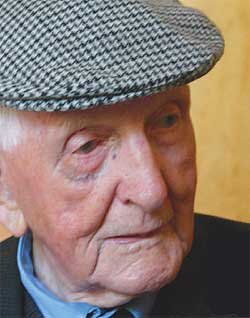On The Death Of A Hero
With the death of Dan Keating one of Ireland’s last remaining links to the heroic episodes of the Tan War period has been lost forever.
Dan, a man who dedicated his long and illustrious life to resisting British rule in our country passed away, following a short illness, on Tuesday (October 2) at the age of 105.
He was born in the townland of Ballygamboon in County Kerry and joined the ranks of Na Fianna Éireann in the aftermath of the 1916 Easter Rising and the executions of its leadership.
After the demand of the Irish people for self-determination was overwhelmingly confirmed at the ballot box in the 1918 general election, Dan became active in the Irish Republican Army’s 1st Kerry Brigade.
During the Tan War, Dan was involved in many successful actions against the forces of occupation, particularly the brutal Black and Tans, and he lost several comrades while taking the fight to the British war machine.
On July 10, 1921, a day before the truce between the Republican Army and the Crown Forces, Dan’s unit was involved in a gun-battle with the British in county Kerry which cost the lives of five IRA volunteers, as well as those of four enemy soldiers.
Following the signing of the ‘Anglo-Irish Treaty’, Dan stayed true to his politics and fought in defence of the Republic during the Civil War.
In the course of that war, he was captured by Free State forces and spent seven months in their prisons before being released in March 1923.
Despite the reversal inflicted on Irish democracy by the native forces of reaction working in alliance with Britain, Dan was to remain active in the cause of national freedom for many years to come.
He was arrested on several occasions by the Free State in the 1930s, and was reported to have been part of an IRA unit who staged an aborted attempt on the life of the fascist Blueshirt leader Eoin O’Duffy.
Life at this time was particularly hard for Dan, as the forces of reaction that Connolly predicted would take the ascendancy in the event of partition swung into action.
In one incident, while Dan was working as a barman in a Dublin pub, a Civic Guard (forerunner to the Gardaí) took the boss aside to inform him that the likes of Dan shouldn’t be employed.
The boss replied that Dan was a good worker and that there would be “blue murder” from the Bar Workers Union if he was sacked.
Dan was also active in the IRA’s England campaign of the late 1930s and early ‘40s and was interned in the infamous Curragh Camp by De Valera’s government during World War Two.
Always scornful of the Twenty-Six County government’s attempts to lay claim to the legacy of the freedom struggle, Dan turned down a war veteran’s pension. He also refused a token monetary gift from Free State president Mary McAleese on the event of his centenary year, due to her attempts to bring the Queen of England on an official visit to the Twenty-Six Counties.
Dan Keating
In recent years, Dan was a patron of Republican Sinn Féin.
Éirígí Chairperson Brian Leeson paid tribute to Dan’s massive contribution to the freedom struggle.
“The word that would best describe Dan Keating is incorruptible.
“Throughout his long life, when those about him found accommodation with British imperialism or trooped home in defeat, Dan remained steadfast and active in the cause of Irish freedom.
“During his years on active service, in jail or in financial hardship Dan never lost faith in the belief that the Irish people have the right to unity and national independence”
Brian continued, ‘While Dan Keating is no longer with us I am confident that there will be a reincarnation in the near future of Dan’s spirit, politics and determination in a mass effort to end British interference in our affairs once and for all. That would be the only fitting tribute for his life time’s work.”
In one of his final interviews, the Kerry native was asked if he lived his life again would he make the same choices. Without a moment’s hesitation the old warrior replied: “Oh Christ I would!”
Is leor sin.


